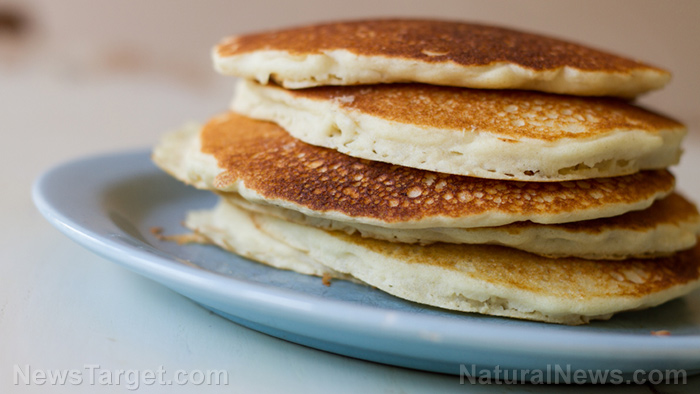Have a taste of frontier survival cooking with cornmeal pancakes
Thursday, August 15, 2019 by Edsel Cook
http://www.bugout.news/2019-08-15-have-a-taste-of-frontier-survival-cooking-with-cornmeal-pancakes.html

The end of the world as we know it doesn’t mean you must resign yourself to eating bad-tasting food. This delicious recipe for cornmeal pancakes borrows from the cookbooks of pioneers who took the Oregon Trail and other westward trails.
When the pioneers took the trails leading westward during the first half of the 19th century, their wagons carried baking soda, cornmeal, flour, and other basics that lasted for up to half a year. Many of them brought a cow along to provide fresh milk during the journey while others kept chickens.
They combined these supplies with other victuals that they bartered, foraged, and hunted during the long trek. Deer, rabbits, and squirrels provided fresh meat to supplement salted pork. Various berries, edible roots, and honey from wild beehives sweetened their food.
In addition to foraged and hunted foodstuffs, the pioneers prepared cornmeal pancakes. The flat cakes took little time and minimal effort to cook over an open fire.
Cornmeal pancakes went well with soups and stews of the time. When served on their own or as a dessert, they received garnish in the form of berries, honey, and other sweet stuff.
A survival recipe for making cornmeal pancakes
The pioneer-inspired recipe whips up half a dozen pancakes, each of which measures six inches in diameter. Each pancake will feed a person.
You may need about 10 minutes to get everything ready. A pancake takes about two minutes to cook, so all six of them need 12 minutes in total.
Ingredients:
- 2 cups of wheat flour
- 1 cup of white cornmeal
- 1/2 teaspoon of salt
- 4 teaspoons of baking soda
- 2 cups of milk
- 1/2 cup of melted butter
- 2 large eggs
Unlike modern-day pancakes, the pioneers didn’t add sugar to their cornmeal flat cakes. The natural sweeteners made the food sweet enough for the palate. Berries and wild honey are also healthier than processed sugar.
If you’re a health-conscious prepper, you may want to avoid sea salt. A 2018 study by Korean researchers from Incheon National University found microplastics in 90 percent of the commercial food-grade salt products that they tested.
Instead, use Himalayan salt. Extracted from underground mines near the Indian Himalayan Mountains, the salt is free from the tiny plastic pieces that contaminate sea salt.
Likewise, try to get the other ingredients from trusted organic sources.
How to cook pioneer-style cornmeal pancakes
Start by putting the dry ingredients in a mixing bowl. Mix the baking soda, cornmeal, flour, and salt. Next, put the melted butter, eggs, and milk in a jug. Whisk them with care.
Next, add the wet ingredients to the mixing bowl. Stir them and the dry ingredients together. The resulting batter must be moist enough to drip from the mixing spoon. If it doesn’t do so, carefully add small amounts of milk.
Cover the base of the griddle with oil and bring it up to moderate heat. Pour the batter over the griddle. Either add enough of the mixture to make a large pancake or reduce the amount to make many smaller cakes.
Cook the batter until its surface bubbles. Flip the pancake over and continue until it takes on a golden-brown color.
The pancakes go well with stew or a tasty dish. If served as a dessert, add berries, cream, and either honey or maple syrup.
The pioneers sprinkled dried fruits and nuts on their cornmeal pancakes. Preppers with survival gardens or homesteaders with food gardens may grow cranberries, gooseberries, and other berries for their flat cakes.
Sources include:
Tagged Under: Tags: bug out, cooking, cornmeal pancakes, food collapse, Himalayan Salt, homesteading, how-to, off grid, pancakes, pioneers, preparedness, prepper, prepping, recipes, sea salt, survival, survival food

